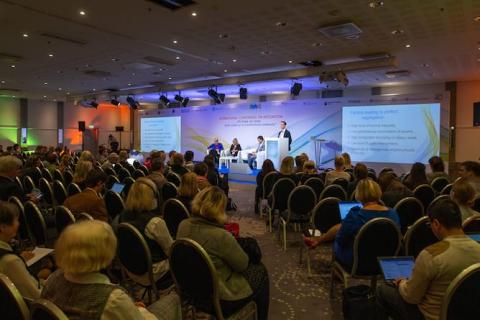Tomorrow, 14 November, is the first day of the two-day international conference ‘Shared Language: Integration in Society through Multilingualism’ being held in Tallinn. It will bring together renowned experts from the United States, Canada, the United Kingdom, Latvia, Denmark, Norway, Germany and Estonia. The presentations and discussions at the conference will focus on identity, education and labour market issues in the light of multiculturalism. The event will culminate in a debate between representatives of Estonian political parties on the topic ‘Multilingual society: A bright future or the greatest threat to a nation-state?’.
A live broadcast of the conference, whose working language will be English, can be followed online at integrationconference.ee. The event will also be covered in Estonian, Russian and English on the ERR news portals err.ee, rus.err.ee and news err.ee.
The two days of the conference will include discussion panels and workshops in which experts, researchers, policy-shapers and participants will talk about such issues as migration, adaptation, integration, language studies, multilingual education and the loss of people’s first language.

The conference will be opened by Minister of Culture Tõnis Lukas. “Estonians have always considered it important to know other languages,” said Minister Lukas. “It’s helped people get by in Estonia, where throughout history the impact of a wide range of languages and cultures have been felt. It also means we’re able to cope nowadays when we go abroad to work or study. That’s why we’re not afraid of other languages, but open as a society. At the same time, our national language is Estonian and our aim is to ensure the preservation of our people, culture and language – which is why Estonian dominates here and why it’s important that people can get by using it everywhere in the country. The state makes it possible for people who live here who come from other national backgrounds to learn the language so that there’s no cultural segregation and everyone has the chance to play an active role in society.”
The keynote speaker at the conference, Copenhagen Business School emeritus professor Robert Phillipson, will be focussing in his presentation on problems related to the spread of English as the universal language of communication. In his view the importance of English is growing throughout Continental Europe as well as in the functions and activities of many European Union institutions, reinforcing the supremacy of the language and pushing others aside in the process, including minority languages. He considers it important to ensure that every Member State has an officially established and implemented language policy that is capable of maintaining a sustainable balance between national and foreign languages at all levels of education.
Pipedrive’s Head of Recruitment Mirjam Laurisaar will be discussing the progress the company has made, as well as the difficulties it has faced, in striking a balance between accepting the diversity of its team and preserving the Estonian identity of the company.
Head of the Department of Language and Linguistics of the University of Essex Monika S. Schmid will be outlining the results of her research into the loss of a person’s first language due to their living and working in a foreign-language environment. Her presentation will focus on how deterioration in first-language skills can affect ties with the person’s home country, relationships with their family members and future professional activities.
University of Edinburgh Professor of Developmental Linguistics Antonella Sorace will be looking at issues of language-learning and preserving skills in different languages in her presentation. In her view it is important that people are able to communicate in a number of languages; what those languages are is not as significant as the ability itself. She says studies have shown that bilingualism, regardless of the status, prestige or global distribution of a language, can give both adults and children in all languages linguistic, cognitive and social advantages, such as improved metalinguistic skills and writing ability, a good understanding of other people’s points of view and intellectual flexibility in complex situations.
Florida Atlantic University professor Erika Hoff will be speaking in her presentation about the fact that many children who are only just starting school have already come into contact at home with a language that is not the majority language of the country they live in. The skills of such children in the majority language often differ from those of children from homes where only one language, the majority language, is spoken. In her view, elementary education policy must take evidence into account regarding factors that affect the early development of language skills in children from minority-language homes. Schools’ practices and principles should take into consideration the existence of these children’s skills in two languages upon starting school. Hoff will also be presenting the results of her research into the different patterns of skills in two languages among five-year-old children from minority-language homes.
The conference will end with a debate between representatives of Estonian political parties on the topic ‘Multilingual society: A bright future or the greatest threat to a nation-state?’. The debate will be chaired by Estonian Public Broadcasting journalist Jüri Nikolajev.
The full programme can be found on the conference website.
The working language of the conference will be English, with simultaneous interpreting into Estonian and Russian.
The event is being run by the Integration Foundation in cooperation with the Ministry of Culture. Also supporting the organisation of the conference are the embassies of the United States, Finland, Germany, Canada and the Czech Republic in Estonia, the British Council and other partners.
